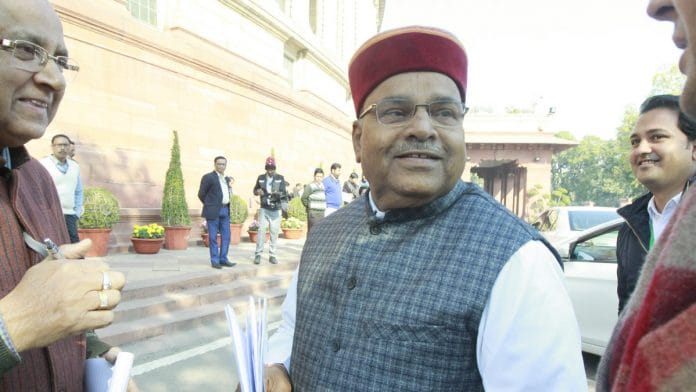New Delhi: Thawarchand Gehlot, the Union minister of social justice and empowerment and Bharatiya Janata Party’s (BJP) prominent Dalit face, created ripples Tuesday when he managed something rare — expressed open disagreement with the decision of a chief minister from his own party.
Gehlot, the BJP’s leader in Rajya Sabha, said Chief Minister Yogi Adityanath-led government’s decision last month to include 17 OBC communities in Uttar Pradesh in the Scheduled Castes (SC) list was “not proper”.
After the matter was raised in the Upper House by Bahujan Samaj Party (BSP) MP Satish Chandra Misra during the Zero Hour, Gehlot said the UP government’s decision was not in accordance with the Constitution.
As he asked the BJP government in Uttar Pradesh to follow the proper procedure, Gehlot seemed to indicate that political affiliations and niceties were less important than due process in decision making and the interests of the Scheduled Castes.
This is perhaps also Gehlot’s way of holding his own, especially considering his otherwise low-profile, non-controversial and soft-spoken image.
Also read: Modi and Shah tell new MPs to felicitate BJP workers for Lok Sabha win, not themselves
Who is Thawarchand Gehlot?
Born in a small village in Madhya Pradesh’s Ujjain, the politician, now 71, graduated from Vikram University in his home district.
Perhaps what makes Gehlot among the party’s most ‘grounded’ ministers is his background of having worked as a labourer. As per his profile on his ministry’s website, he had “worked as a labour in Grasim Industries” during 1965-70, as a treasurer in Grasim Engineering Shramik Sangh and as the secretary of the Bharatiya Mazdoor Sangh-affiliated Chemical Shramik Sangh from 1967-75.
Gehlot was also a part of various labour movements in Ujjain and imprisoned during the Congress government-imposed Emergency in 1975.
Gehlot’s biggest political moment came when he was inducted into the Modi cabinet in 2014. He happens to be one of the few ministers who have retained their portfolio in the second Modi government, which perhaps is a stamp of approval on his work and disposition by the BJP’s top leadership.
An old-school politician
Gehlot is an old BJP hand, a seasoned politician who has even served as a member of the BJP’s precursor — the Bharatiya Jan Sangh — from 1962-77, and then as the vice-president and general secretary of the Janata Party in Ujjain district.
In the mid-1980s, when the BJP’s presence in Parliament was limited to just two seats in the Lok Sabha, Gehlot was a key office-bearer of the BJP Yuva Morcha, before graduating to serving as the party president in Ratlam district for two years from 1986.
He has held several positions since 1986 — from national secretary of the party in Madhya Pradesh to its national vice-president, national general secretary, member of the Parliamentary Board and Central Election Committee, and now a two-time cabinet minister.
An old-school politician, Gehlot is every bit a grassroots Sangh leader — having joined the Rashtriya Swayamsevak Sangh (RSS) way back in 1962 and going on to hold various positions in it.
A three-term MLA in Madhya Pradesh, four-time Lok Sabha and two-time Rajya Sabha MP, Gehlot has fairly extensive legislative experience.
Also read: BJP signals its Dalit outreach by making Thawarchand Gehlot Leader of Rajya Sabha
The ‘low-key’ leader
If there is one thing that has defined Gehlot’s political ride, it is his image of being a low-profile, non-controversial and grounded leader.
According to sources in the BJP, it is this very image of being “low-key, diligent, hardworking and, most importantly, obedient” that makes Gehlot enjoy Prime Minister Narendra Modi’s confidence.
As a minister, Gehlot was initially known to keep the media at bay, uncomfortable with too much limelight or overt prominence. However, it isn’t as if his earlier tenure as minister was entirely smooth.
The government’s decision to amend the Scheduled Caste and Scheduled Tribe (Prevention of Atrocities) Act to restore provisions that had been diluted by the Supreme Court became a sore point, generating much controversy and inviting the ire of the upper castes — traditionally the BJP’s strength. With the issue concerned his ministry, Gehlot was drawn into the wrangle.
To assuage the resentful upper castes, the Modi government went on to bring in a 10 per cent quota for the poor in the general category. Gehlot’s department — the nodal ministry — had been, however, in the dark for a long time.
In a written reply given in the Lok Sabha by the social justice and empowerment ministry on 8 January this year, it denied there was any proposal to provide reservation to the economically backward sections in the general category. Ironically, this reply came a day after the Union cabinet had already approved the proposal.
Gehlot had later defended the Modi government’s move, claiming this aimed to empower the poor and was not for electoral gains.







Thanks with the highest gratitude to the Hon’ble Minister for his frankness.